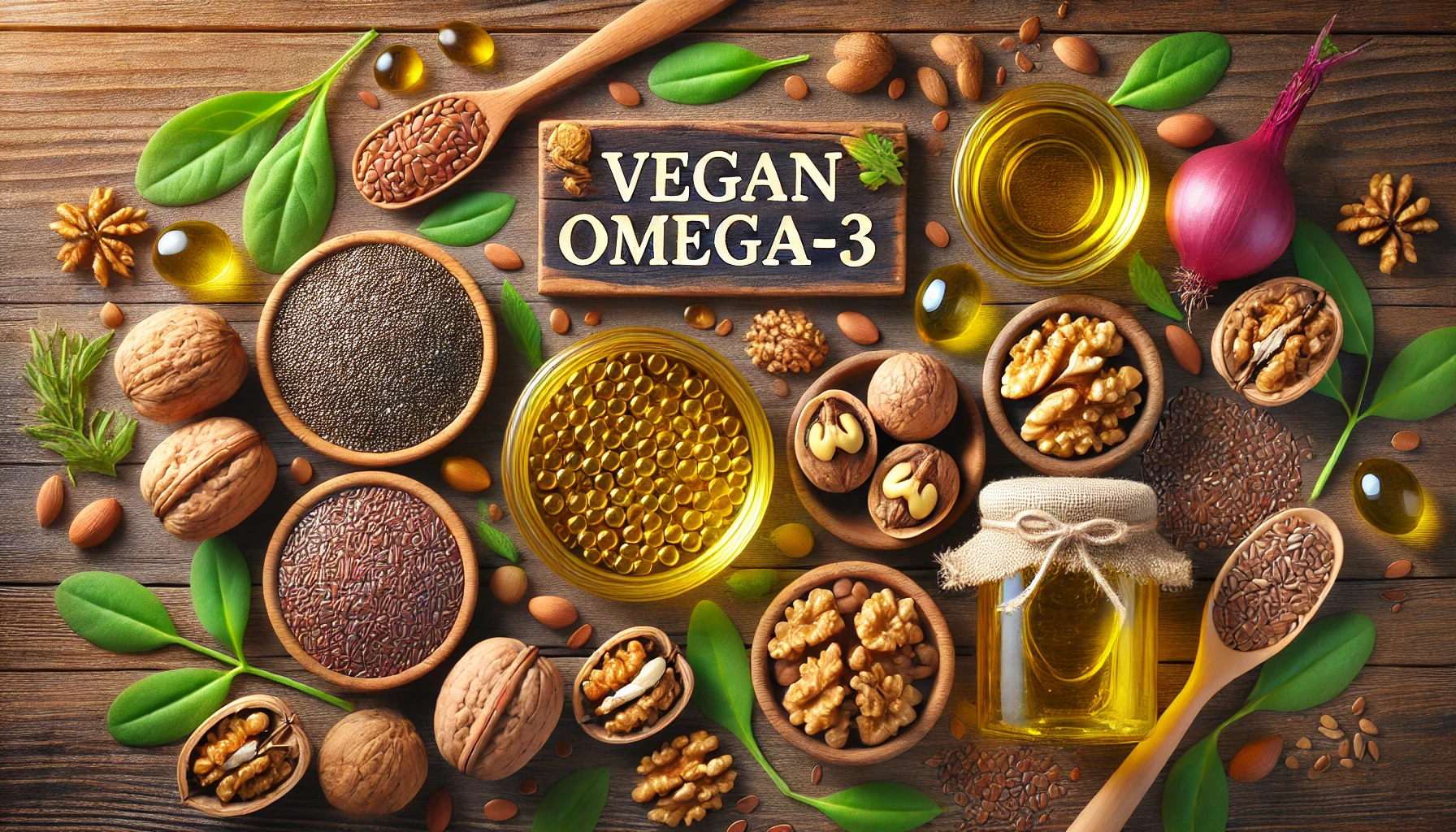What is vegan omega 3?
Definition and Importance
Vegan omega 3 fatty acids are a group of essential fats that you must obtain through your diet because your body cannot produce them on its own. They are crucial for brain function as well as normal growth and development. They also have anti-inflammatory properties, which can help reduce the risk of chronic diseases such as heart disease, arthritis, and cancer.
Types of Omega-3 Fatty Acids
There are three main types of omega-3 fatty acids:
- ALA (alpha-linolenic acid) – This plant-based omega-3 is found in high amounts in flaxseeds, chia seeds, and walnuts. ALA is a precursor to the other two types of omega-3, meaning your body can convert it into EPA and DHA, although this process is not very efficient.
- EPA (eicosapentaenoic acid) – Found primarily in fish and algae oil, EPA is known for its role in reducing cellular inflammation.
- DHA (docosahexaenoic acid) – This type is crucial for brain health and is primarily found in fish and algae oils. DHA is a key structural component of the brain, the retina, and numerous other body parts.
Role in Health and Disease Prevention
Vegan omega 3 fatty acids play a critical role in maintaining heart health by regulating blood clotting and vessel constriction, are essential for prenatal and postnatal neurological development, and may help prevent inflammation, thereby reducing the risk of chronic conditions such as heart disease, cancer, and arthritis.
The Vegan Diet and Omega-3
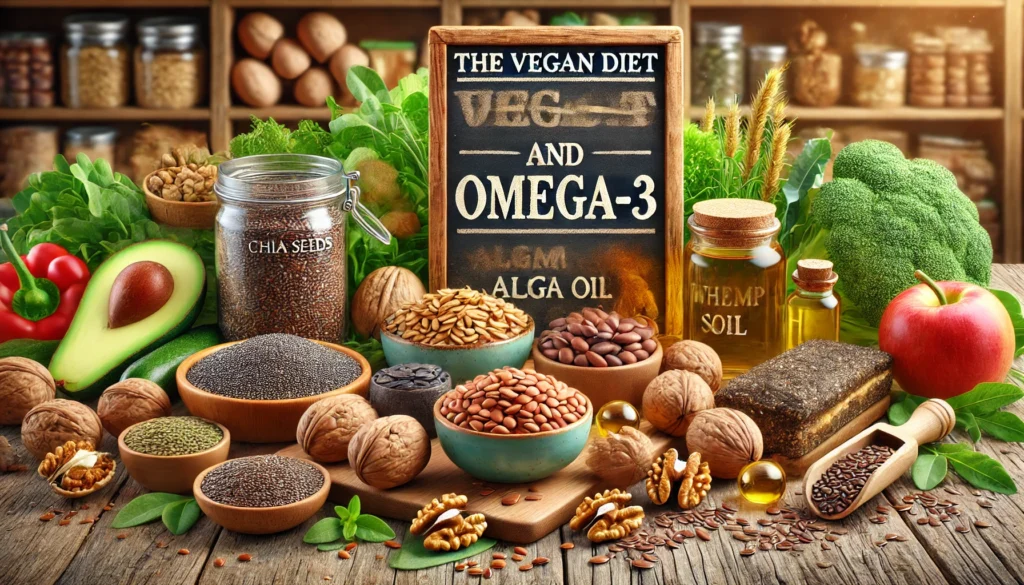
Overview of Vegan omega 3 Sources in Traditional Diets
Traditional diets obtain Vegan omega 3 primarily from fish oils and fatty fish such as salmon, mackerel, and sardines. Eggs and some meat products also provide smaller amounts. These sources are rich in EPA and DHA, the more readily used forms of omega-3.
Challenges for Vegans in Getting Omega-3
Vegans face specific challenges in consuming adequate omega-3 because plant-based sources are limited to ALA. The body’s ability to convert ALA into EPA and DHA is inefficient, estimated at less than 10% for EPA and 2-5% for DHA. This conversion rate can also be affected by the overall diet, including the intake of other fats, overall health, and genetic factors.
Comparing Animal vs. Plant Sources of Vegan omega 3
Understanding these sources and the differences in how they are metabolized is crucial for anyone on a vegan diet to ensure they are getting adequate omega-3 to support their overall health.
- Animal sources (primarily fish): Provide direct forms of EPA and DHA. These are more bioavailable, which means they are more efficiently absorbed and utilized by the body.
- Plant sources: Include flaxseeds, chia seeds, hemp seeds, and walnuts, which mostly provide ALA. While ALA is a precursor to EPA and DHA, the conversion rates in the body are low. However, advancements in food technology have made algae-based supplements a viable and direct source of EPA and DHA suitable for vegans.
Health Benefits of Vegan omega 3

Cardiovascular Health
Vegan sources of omega-3 fatty acids, such as algae oil, flaxseeds, and walnuts, have been shown to support cardiovascular health effectively. These plant-based fats help reduce cholesterol levels, lower blood pressure, and decrease triglycerides. Regular intake can also reduce the likelihood of developing heart disease by improving arterial health and reducing arterial plaque formation.
Brain Health and Cognitive Function
Omega-3 fatty acids are crucial for brain health and cognitive function. They play a significant role in neuron structure and function, influencing memory, performance, and prevent cognitive decline. Studies have indicated that a diet rich in omega-3 from plant sources can help maintain brain health, enhance concentration, and potentially lower the risk of neurodegenerative diseases.
Anti-Inflammatory Effects
Omega-3 fatty acids are well-known for their anti-inflammatory properties. For vegans, consuming adequate amounts of omega-3 from sources like chia seeds, hemp seeds, and algae can help manage inflammation in the body. This is particularly beneficial in reducing the symptoms of chronic diseases such as arthritis, reducing muscle soreness from exercise, and supporting overall immune health.
Omega-3 Supplements for Vegans
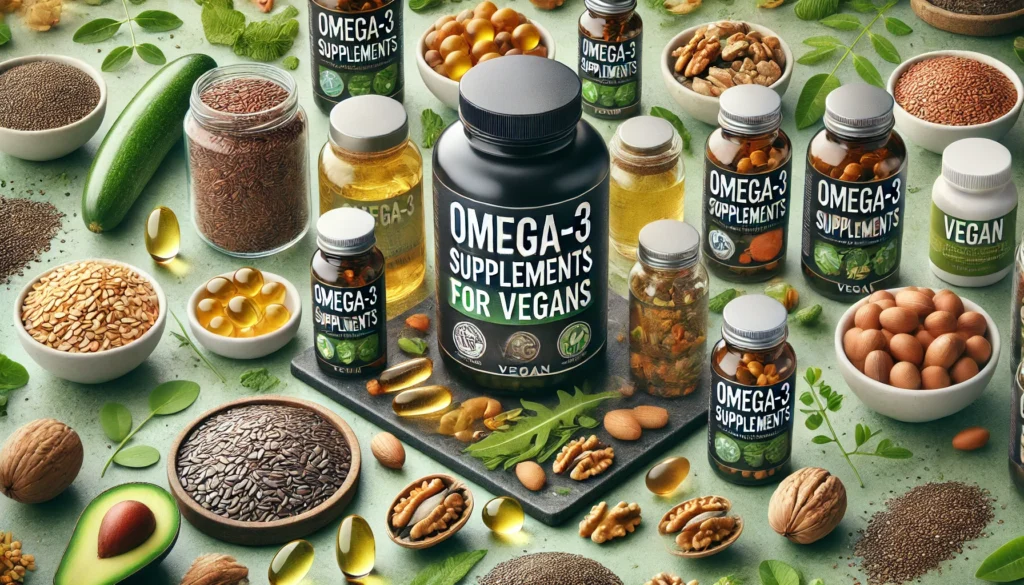
Types of Vegan omega 3 Supplements
The primary types of vegan omega 3 supplements include algae-based DHA and EPA supplements, and flaxseed oil, which is high in ALA (alpha-linolenic acid). These supplements offer alternatives to fish oil, providing essential fatty acids necessary for optimal health without using animal products.
- Algal Oil Capsules: These are the most popular form of vegan omega 3 supplements, providing a direct source of DHA and EPA.
- Ground Flaxseed Powder: While primarily a source of ALA (alpha-linolenic acid), which the body can convert to EPA and DHA, these powders are an easy additive to smoothies and baked goods.
- Omega-3 Enriched Foods: Some products are fortified with algal oil, such as certain brands of vegan milk, yogurt, and eggs.
How to Choose the Right Supplement
Choosing the right vegan omega 3 supplement involves considering several factors, including the type of omega-3 fatty acids provided (DHA, EPA, ALA), the source of the omega-3, the purity and sustainability of the production process, and third-party testing for contaminants. It’s also important to consider the dosage to meet daily recommended intakes.
Potential Side Effects and Considerations
While vegan omega 3 supplements are generally safe for most people, some may experience mild side effects such as digestive discomfort or fishy aftertaste (from algae oils). It’s crucial to start with a lower dose to assess tolerance. Additionally, individuals on blood-thinning medications should consult with a healthcare provider as omega-3 can increase bleeding risk.
Incorporating Vegan Omega 3 into Your Diet

Daily Recommended Intakes
Understanding the daily recommended intakes of omega-3 is crucial for maintaining optimal health, especially on a vegan diet. For adults, the general recommendation for total omega-3 fatty acids ranges from 1.1 to 1.6 grams per day, depending on age and sex. However, as vegan sources mainly provide ALA (alpha-linolenic acid), it’s vital to ensure adequate conversion to EPA and DHA, the forms more readily used by the body.
Creative Ways to Incorporate Omega-3-rich Foods
Introducing omega-3-rich foods into your diet doesn’t have to be a chore. Simple additions like sprinkling ground flaxseed over your morning oatmeal, adding chia seeds to your smoothie, or dressing salads with hemp seed oil can significantly boost your omega-3 intake. Regularly including walnuts and edamame in snacks and meals also contributes beneficially.
Recipes and Meal Ideas
Offering practical meal ideas can help integrate omega-3 into everyday eating practices. Recipes could include flaxseed pesto pasta, chia pudding, or walnut and avocado toast. Providing these creative and tasty options encourages the incorporation of omega-3 without compromising on flavor or variety.
Challenges and Considerations
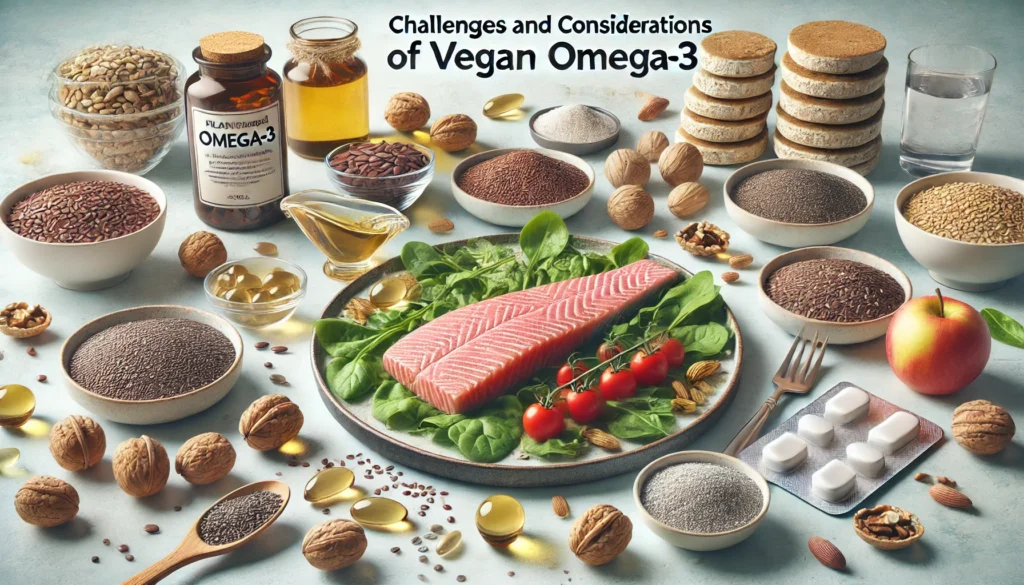
Balancing Omega-3 and Omega-6 Fatty Acids
The balance between omega-3 and omega-6 fatty acids is vital for maintaining overall health. Omega-6 fatty acids, commonly found in plant oils like sunflower, corn, and soybean oil, are more abundant in most diets compared to omega-3s. The typical Western diet tends to have a skewed ratio favoring omega-6, which can lead to inflammation and other health issues. Vegans need to be particularly mindful of the sources and ratios of these fatty acids. To improve the omega-3 to omega-6 ratio:
- Reduce intake of high omega-6 oils: Opt for oils with a better omega-3 to omega-6 balance, such as flaxseed oil or canola oil.
- Increase rich omega-3 sources: Incorporate more flaxseeds, chia seeds, hemp seeds, and algae oils, which are excellent sources of vegan omega 3.
- Consider your whole diet: Focus on whole, unprocessed foods, which naturally contain lower levels of omega-6 and higher levels of natural antioxidants.
Addressing Deficiencies: Signs You Need More Omega-3
Omega-3 fatty acids are crucial for brain function, heart health, and overall inflammation control. A deficiency in these essential nutrients can lead to various health issues. Signs that might indicate an omega-3 deficiency include:
- Dry skin: One of the early signs of omega-3 deficiency is dry, itchy skin or even dandruff.
- Brittle nails: Weak, brittle nails can also be a symptom of insufficient omega-3 intake.
- Fatigue and poor concentration: Lack of omega-3 fatty acids can contribute to feelings of fatigue and difficulty concentrating.
- Joint pain: Increased joint stiffness and pain may occur due to heightened inflammation levels when omega-3 levels are low.
Recognizing these signs early can help you adjust your diet accordingly and prevent more serious health problems.
Long-Term Management of Omega-3 Levels
Implementing these strategies not only helps in correcting immediate deficiencies but also contributes to long-term health and prevention of chronic diseases. Maintaining adequate levels of omega-3 over the long term requires consistent dietary attention and possibly supplementation. For vegans, managing omega-3 levels involves:
- Regular dietary assessment: Periodically review your diet to ensure it includes sufficient omega-3 sources.
- Supplementation if necessary: Consider vegan omega 3 supplements derived from algae to ensure adequate DHA and EPA levels.
- Monitoring health markers: Regular check-ups that include lipid profile tests can help track how well your body is maintaining omega-3 and omega-6 balance.
Impact of Omega-3 on Long-term Vegan Health
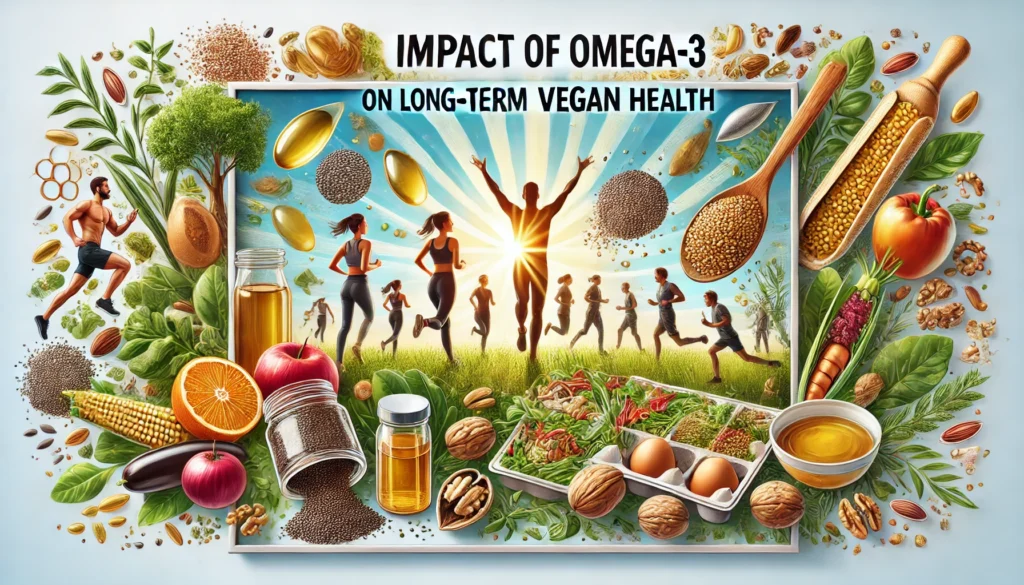
Long-term Health Benefits
Omega-3 fatty acids are essential components of the membranes that surround each cell in your body. For vegans, consuming adequate amounts of omega-3, especially from plant-based sources, is crucial for maintaining overall health. Long-term health benefits include improved heart health, reduced risk of inflammation, and enhanced brain function. Studies have shown that a higher intake of plant-based omega-3s can lead to a lower risk of cardiovascular diseases and may help in reducing the occurrence of mental health disorders such as depression and anxiety.
Case Studies and Research Outcomes
Numerous studies have examined the impact of a vegan diet rich in omega-3 fatty acids on health over the long term. One significant study published in the “Journal of Nutrition and Metabolism” highlighted that vegans who consumed sufficient ALA (alpha-linolenic acid) from sources like flaxseeds and walnuts showed improved cardiovascular markers. Another research focused on the elderly vegan population demonstrated that those with higher intake of plant-based omega-3s had better cognitive function compared to those with lower intake levels.
Expert Opinions and Recommendations
Nutrition experts often recommend that vegans pay particular attention to their omega-3 intake to ensure it meets the daily recommended levels. The consensus is to incorporate a variety of omega-3-rich foods into the diet regularly. Experts like Dr. Michael Greger, author of “How Not to Die,” suggest that vegans should consider algae-based DHA supplements as a direct source of the essential fatty acids crucial for brain health. Moreover, regular monitoring of omega-3 levels can help vegans adjust their diets accordingly to prevent deficiencies and promote long-term health.
